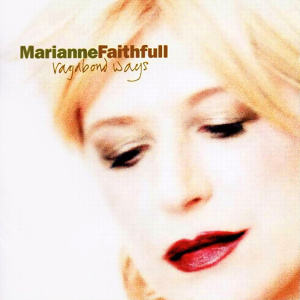A few years ago, there was a study undertaken to find the ‘most aesthetically pleasing song intro” in the history of music, or words to that effect. The winner was deemed to be The Righteous Brothers‘ 1965 version of the Phil Spector co-write (with Barry Mann and Cynthia Weill) ‘You’ve Lost That Lovin’ Feelin‘.
Personally, I think they may have overlooked Marianne Faithfull‘s title track from her 1999 album Vagabond Ways. It draws you in from the off with her frank, autobiographical admission: “Oh, doctor, please, I drink and I take drugs, I love sex and I move around a lot. I had my first baby at fourteen…” before the remarkably poetic nuance of the line “and yes I guess I do have vagabond ways” which sings beautifully and is simply one of the most effectively delivered lyrics of anything sitting in anybody‘s music collection, let alone my own.
The whole record feels autobiographical from that moment on, a somewhat impressive trick pulled off by Faithfull as many of the songs here were actually written by other musical luminaries. Take ‘Incarceration Of A Flower Child‘, for example, which is track two here. Given the stark confessional feel of its predecessor, you’d be forgiven for thinking it was perhaps a continuation of a life well – and not so well – lived, with desperate appeals like “Please don’t take Jasmine away and leave me alone” making us wonder whether she once had a child taken into care. But then we learn that this song was written back in the 1960s by Roger Waters but never recorded by Pink Floyd. As soon as you realise this, you can hear, in your mind, seeds of the later, world-dominating records that the band would go on to make, and it’s testament to Faithfull’s ability as a performer that she can adapt this song with such panache and theatrical drama that she has well and truly made it her own.
Not that Marianne is any slouch herself in terms of songwriting, as the triple whammy of collaborations that follow demonstrate handsomely, ‘File It Under Fun From The Past‘ a minor key lament (actually in a major key but it sounds quite downbeat) about unrequited love from a bygone age, and then ‘Electra‘, with its impeccably conveyed, and rather a heartbreaking lyric: “I know that woman in the mirror/That creature has my father’s eyes/He saw her once and then forgot her/She remembers all his lies.” Rounding off the trio is the admirable ‘Wilder Shores Of Love‘, not quite as memorable as its two counterparts but still effective with its crashing wave imagery.
The Daniel Lanois (who also produced this album with Mark Howard) penned ‘Marathon Kiss‘ is pretty, sincere and gently lilting before the orchestral ‘For Wanting You‘ (Elton John and Bernie Taupin) feels like the romantic theme of a 1930s movie.
‘Great Expectations‘ sees a further outing for Lanois as co-writer in what is probably the most restrained number on Vagabond Ways though it works terrifically and then Faithfull’s audacious take on Leonard Cohen‘s ‘Tower Of Song‘ is simply sublime; given a kind of carnival feel, almost reggae in spirit, it is a prime example of a cover coming off perfectly. It’s just wonderful.
The spoken word ‘After The Ceasefire‘ (Lanois again) might seem a little out of place as the album closer, though the narrative strangely manages to fit the long player’s semi-autobiographical nature. That said, her version of Bob Dylan‘s ‘Blood In My Eyes‘ (only previously available as a bonus track on the Japanese edition) provides a welcome respite from the drama.
This expanded edition includes five further tracks, four of which are demos of ‘Vagabond Ways‘, ‘Incarceration Of A Flower Child‘, ‘Electra‘ and ‘Tower Of Song‘ which don’t really deviate a great deal from the versions that ended up on the finished album, but worth the price alone is the dreamy cabaret jazz of the previously unreleased ‘Drifting‘, which is up there with her best recordings.
For me, her 2018 album Negative Capability remains Marianne Faithfull’s out and out masterpiece. But there’s no doubt that Vagabond Ways was the catalyst for a real purple patch in her career – perhaps partly inspired by her 1998 album Kurt Weill‘s The Seven Deadly Sins opera – that led to newfound respect and acknowledgement of her talents from critics and public alike.




